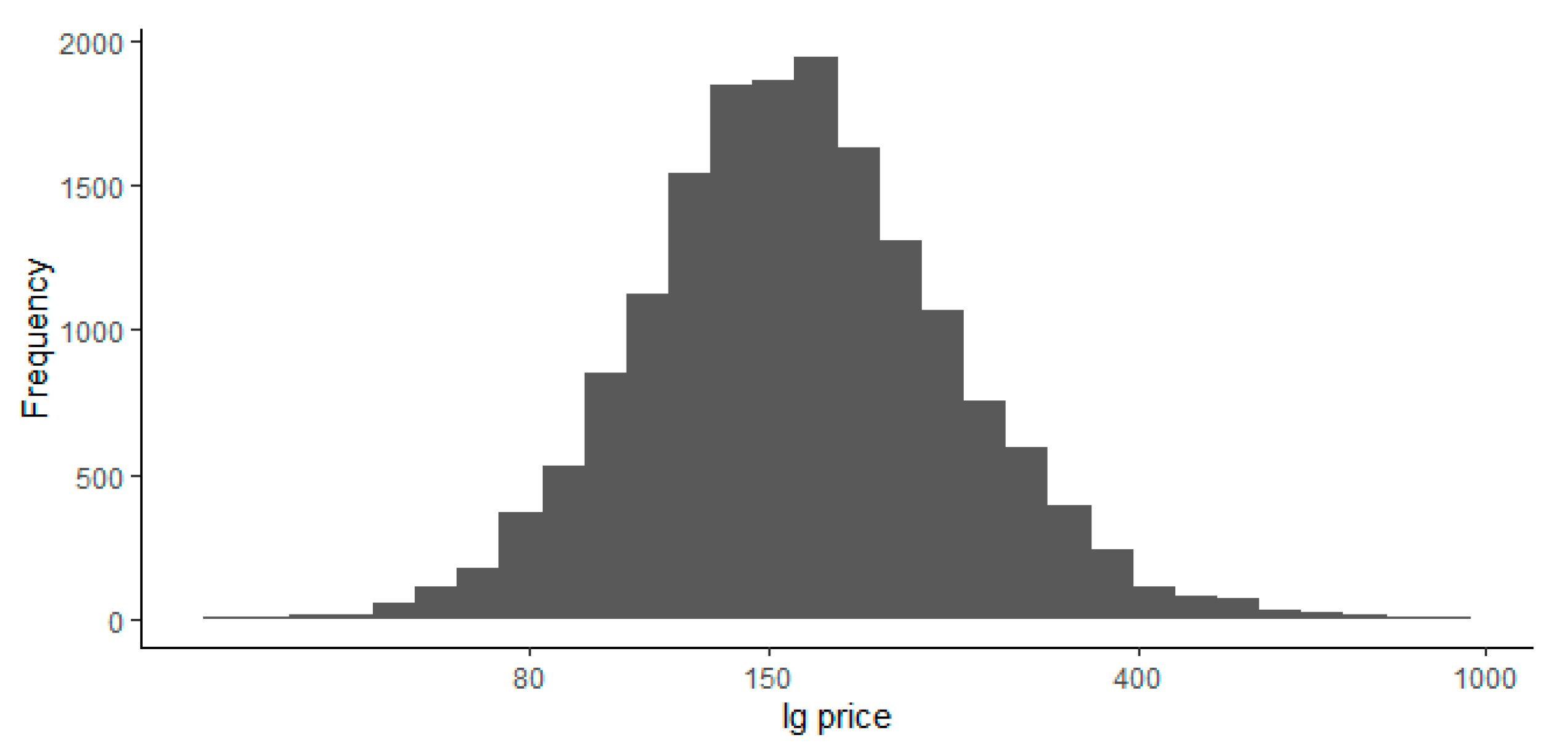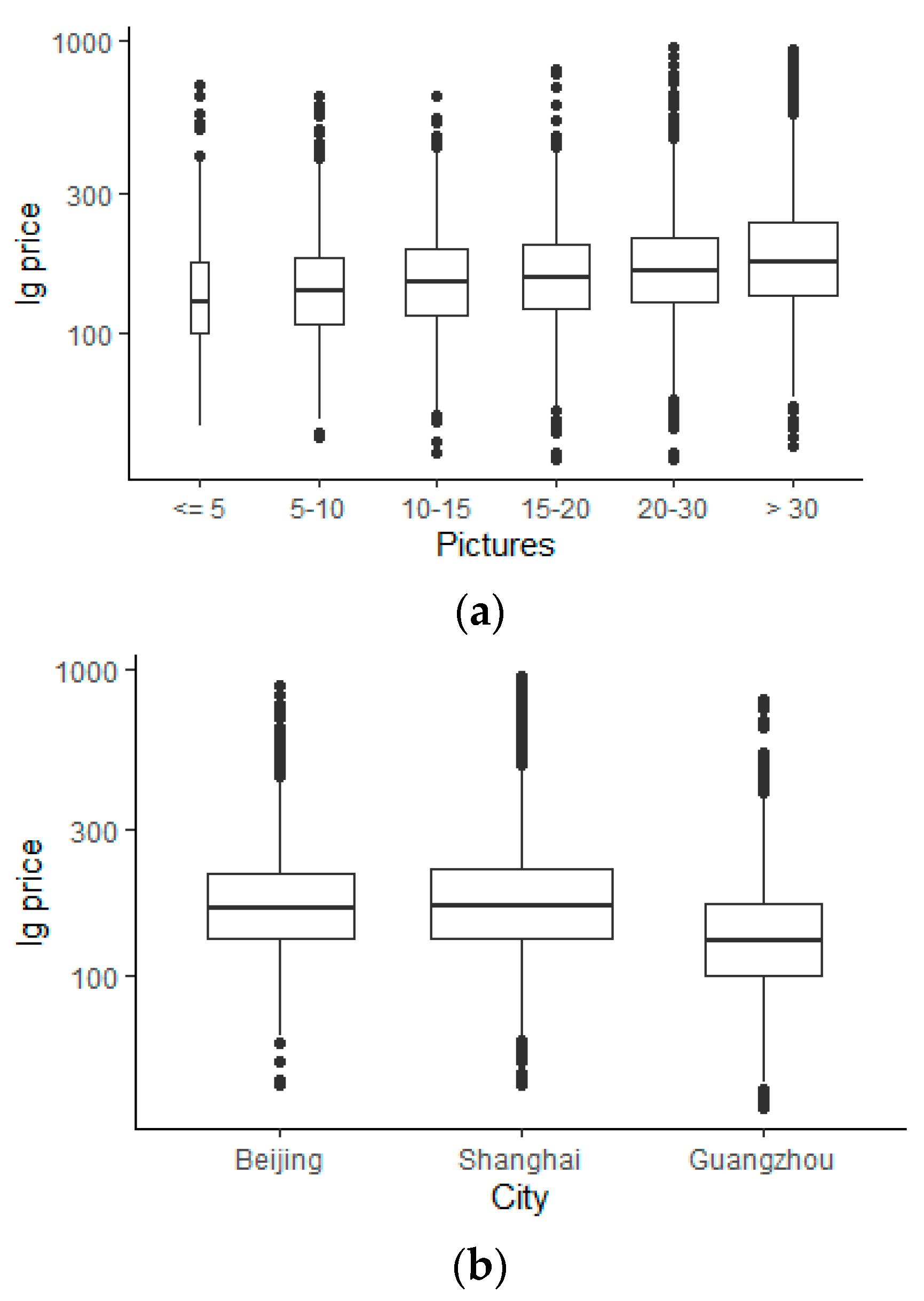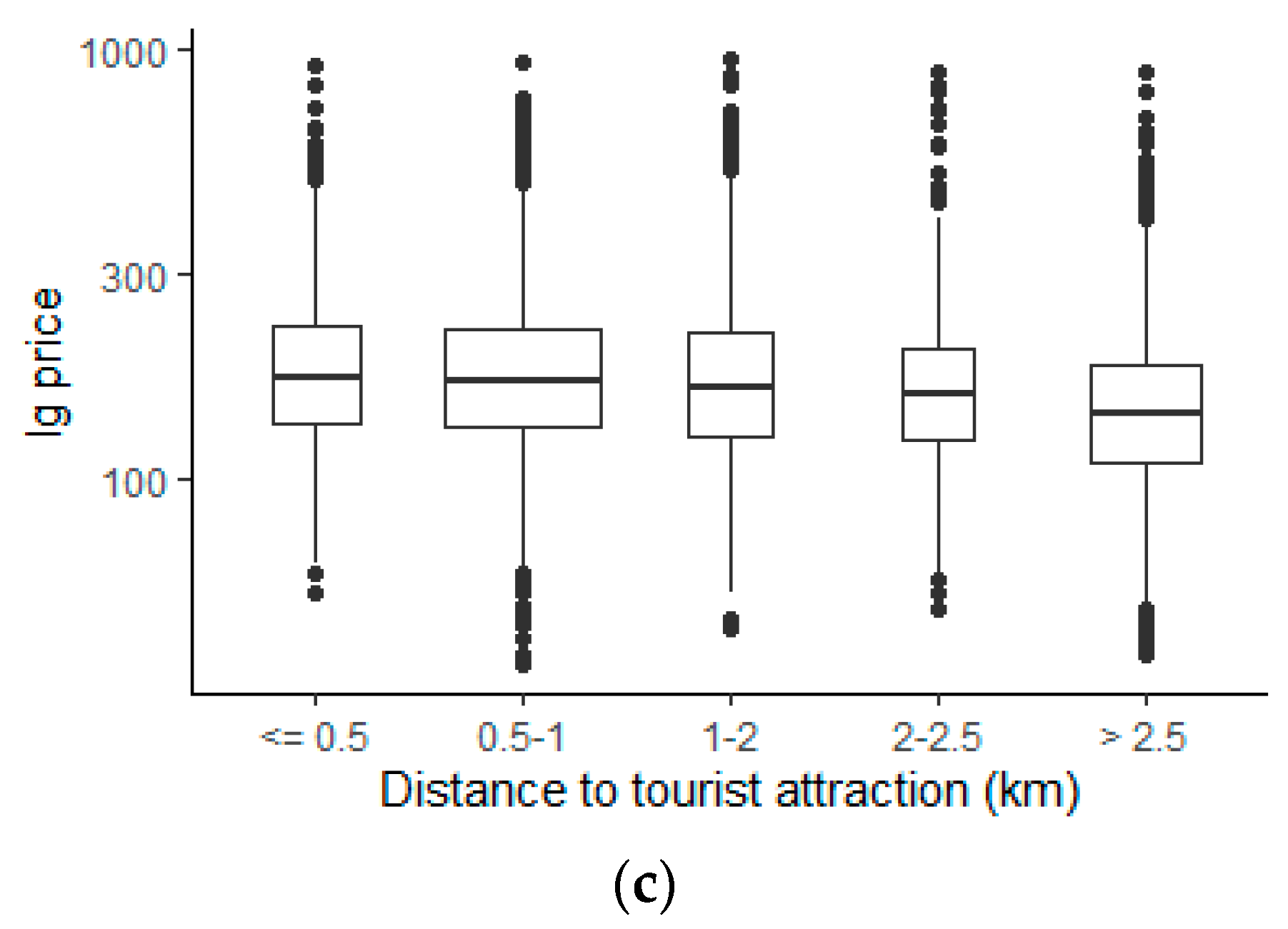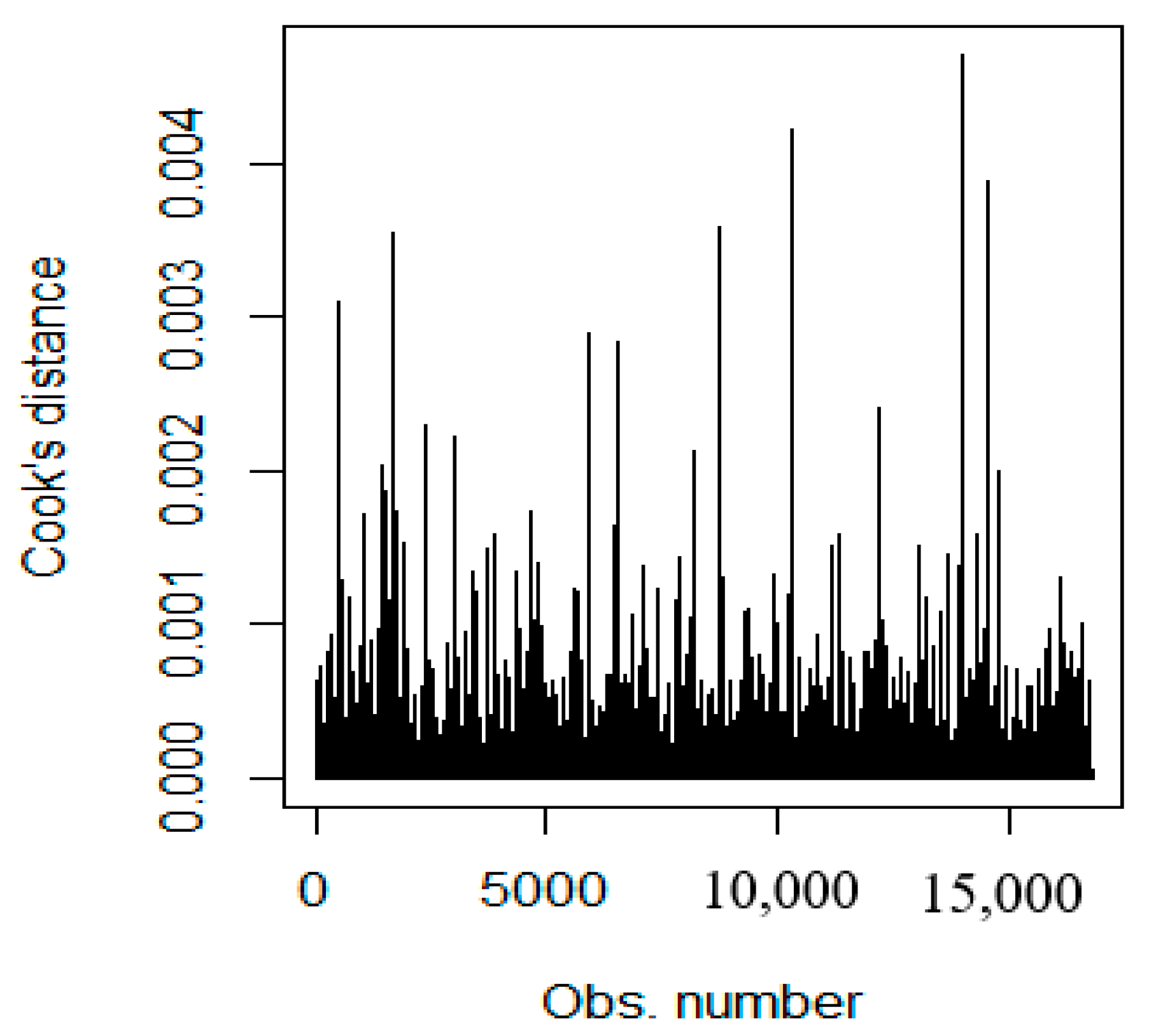Study of Price Determinants of Sharing Economy-Based Accommodation Services: Evidence from Airbnb.com
Abstract
1. Introduction
- This study attempts to build a framework for sharing economy-based accommodation services that identifies not only the crucial influencing factors but also the interaction terms between these factors.
- This study seeks to build a prediction model that provides appropriate pricing decisions for sharing economy-based accommodation services.
2. Literature Review
2.1. Sharing Economy-Based Accommodation Services
2.2. Price Determinants of Traditional Accommodation Services
2.3. Price Determinants of Sharing Economy-Based Accommodation Services
2.4. Theoretical Contributions
3. Methodology
3.1. Data Collection
3.2. Description of Variables
3.3. Data Analysis
4. Results
4.1. Price Determinants of Sharing Economy-Based Accommodation Services
4.2. Price Determinants of Sharing Economy-Based Accommodation Services with Interaction Effects
4.3. Prediction Model
5. Discussion
6. Conclusions
Author Contributions
Funding
Acknowledgments
Conflicts of Interest
References
- Roma, P.; Panniello, U.; Nigro, G.L. Sharing economy and incumbents’ pricing strategy: The impact of Airbnb on the Hosp. industry. Int. J. Prod. Econ. 2019, 214, 17–29. [Google Scholar] [CrossRef]
- Zervas, G.; Proserpio, D.; Byers, J.W. The rise of the sharing economy: Estimating the impact of Airbnb on the hotel industry. J. Mark. Res. 2017, 54, 687–705. [Google Scholar] [CrossRef]
- Jiang, B.; Tian, L. Collaborative consumption: Strategic and economic implications of product sharing. Manag. Sci. 2018, 64, 1171–1188. [Google Scholar] [CrossRef]
- Buhalis, D.; Andreu, L.; Gnoth, J. The dark side of the sharing economy: Balancing value co-creation and value co-destruction. Psychol. Mark. 2020, 37, 689–704. [Google Scholar] [CrossRef]
- Buhalis, D.; Harwood, T.; Bogicevic, V.; Viglia, G.; Beldona, S.; Hofacker, C. Technological disruptions in services: Lessons from Tour. and Hosp. J. Serv. Manag. 2019, 30, 484–506. [Google Scholar] [CrossRef]
- Blal, I.; Singal, M.; Templin, J. Airbnb’s effect on hotel sales growth. Int. J. Hosp. Manag. 2018, 73, 85–92. [Google Scholar] [CrossRef]
- iiMedia Research. 2018–2019 China Online Rental Industry Special Report. Available online: https://www.iimedia.cn/c400/63340.html (accessed on 18 October 2019).
- Sootoo Research. 2018 Industry Special Report of Online Short-Term Rental in China. Available online: https://www.sohu.com/a/301541707_174789 (accessed on 18 October 2019).
- Hung, W.T.; Shang, J.K.; Wang, F.C. Pricing determinants in the hotel industry: Quantile regression analysis. Int. J. Hosp. Manag. 2010, 29, 378–384. [Google Scholar] [CrossRef]
- Lockyer, T. The perceived importance of price as one hotel selection dimension. Tour. Manag. 2005, 26, 529–537. [Google Scholar] [CrossRef]
- Zhang, Z.; Ye, Q.; Law, R. Determinants of hotel room price: An exploration of travelers’ hierarchy of accommodation needs. Int. J. Contemp. Hosp. Manag. 2011, 23, 972–981. [Google Scholar] [CrossRef]
- Wang, D.; Nicolau, J.L. Price determinants of sharing economy based accommodation rental: A study of listings from 33 cities on Airbnb.com. Int. J. Hosp. Manag. 2017, 62, 120–131. [Google Scholar] [CrossRef]
- Ert, E.; Fleischer, A.; Magen, N. Trust and reputation in the sharing economy: The role of personal photos in Airbnb. Tour. Manag. 2016, 55, 62–73. [Google Scholar] [CrossRef]
- Ma, X.; Hancock, J.T.; Mingjie, K.L.; Naaman, M. Self-disclosure and perceived trustworthiness of Airbnb host profiles. In Proceedings of the ACM Conference on Computer Supported Cooperative Work and Social Computing, Association for Computing Machinery, New York, NY, USA, 25 February 2017; pp. 2397–2409. [Google Scholar] [CrossRef]
- Chica-Olmo, J.; González-Morales, J.G.; Zafra-Gómez, J.L. Effects of location on Airbnb apartment pricing in Málaga. Tour. Manag. 2020, 77, 103981. [Google Scholar] [CrossRef]
- Perez-Sanchez, V.R.; Serrano-Estrada, L.; Marti, P.; Mora-Garcia, R.T. The what, where, and why of airbnb price determinants. Sustainability (Switzerland) 2018, 10, 4596. [Google Scholar] [CrossRef]
- Zhang, Z.; Chen, R.; Han, L.; Yang, L. Key factors affecting the price of Airbnb listings: A geographically weighted approach. Sustainability 2017, 9, 1635. [Google Scholar] [CrossRef]
- Cai, Y.; Zhou, Y.; Ma, J.; Scott, N. Price determinants of Airbnb listings: Evidence from Hong Kong. Tour. Anal. 2019, 24, 227–242. [Google Scholar] [CrossRef]
- Chen, Y.; Xie, K.L. Consumer valuation of Airbnb listings: A hedonic pricing approach. Int. J. Contemp. Hosp. Manag. 2017, 29, 2405–2424. [Google Scholar] [CrossRef]
- Gibbs, C.; Guttentag, D.; Gretzel, U.; Morton, J.; Goodwill, A. Pricing in the sharing economy: A hedonic pricing model applied to Airbnb listings. J. Travel Tour. Mark. 2018, 35, 46–56. [Google Scholar] [CrossRef]
- Guttentag, D. Airbnb: Disruptive innovation and the rise of an informal Tour. accommodation sector. Curr. Issues Tour. 2015, 18, 1192–1217. [Google Scholar] [CrossRef]
- Hamari, J.; Sjöklint, M.; Ukkonen, A. The sharing economy: Why people participate in collaborative consumption. J. Assoc. Inf. Sci. Technol. 2016, 67, 2047–2059. [Google Scholar] [CrossRef]
- Mareike, M. Collaborative consumption: Determinants of satisfaction and the likelihood of using a sharing economy option again. J. Consum. Behav. 2015, 14, 193–207. [Google Scholar]
- Yi, J.; Yuan, G.; Yoo, C. The effect of the perceived risk on the adoption of the sharing economy in the Tour. industry: The case of Airbnb. Inf. Process. Manag. 2020, 57, 102108. [Google Scholar] [CrossRef]
- Bae, S.J.; Lee, H.; Suh, E.-K.; Suh, K.-S. Shared experience in pretrip and experience sharing in posttrip: A survey of Airbnb users. Inf. Manag. 2017, 54, 714–727. [Google Scholar] [CrossRef]
- Mao, Z.; Lyu, J. Why travelers use Airbnb again: An integrative approach to understanding travelers’ repurchase intention. Int. J. Contemp. Hosp. Manag. 2017, 29, 2464–2482. [Google Scholar] [CrossRef]
- Liang, L.J.; Choi, H.C.; Joppe, M. Exploring the relationship between satisfaction, trust and switching intention, repurchase intention in the context of Airbnb. Int. J. Hosp. Manag. 2018, 69, 41–48. [Google Scholar] [CrossRef]
- Liang, L.J.; Choi, H.S.C.; Joppe, M. Understanding repurchase intention of Airbnb consumers: Perceived authenticity, electronic word-of-mouth, and price sensitivity. J. Travel Tour. Mark. 2018, 35, 73–89. [Google Scholar] [CrossRef]
- Mattila, A.S.; O’Neill, J.W. Relationships between hotel room pricing, occupancy, and guest satisfaction: A longitudinal case of a midscale hotel in the United States. J. Hosp. Tour. Res. 2003, 27, 328–341. [Google Scholar] [CrossRef]
- Israeli, A.A. Star rating and corporate affiliation: Their influence on room price and performance of hotels in Israel. Int. J. Hosp. Manag. 2002, 21, 405–424. [Google Scholar] [CrossRef]
- Dudás, G.; Kovalcsik, T.; Vida, G.; Boros, L.; Nagy, G. Price determinants of Airbnb listing prices in lake balaton touristic region, Hungary. Eur. J. Tour. Res. 2020, 24, 1–18. [Google Scholar]
- Yao, B.; Qiu, R.T.R.; Fan, D.X.F.; Liu, A.; Buhalis, D. Standing out from the crowd–an exploration of signal attributes of Airbnb listings. Int. J. Contemp. Hosp. Manag. 2019, 31, 4520–4542. [Google Scholar] [CrossRef]
- Ye, Q.; Law, R.; Gu, B. The impact of online user reviews on hotel room sales. Int. J. Hosp. Manag. 2009, 28, 180–182. [Google Scholar] [CrossRef]
- Chattopadhyay, M.; Mitra, S.K. What Airbnb Host Listings Influence Peer-to-Peer Tourist Accommodation Price? J. Hosp. Tour. Res. 2020, 44, 597–623. [Google Scholar] [CrossRef]
- Wu, X.; Qiu, J. A Study of Airbnb Listing Price Determinants: Based on Data from 36 Cities in China. Tour. Trib. 2019, 34, 13–28. [Google Scholar] [CrossRef]




| Category | Determinants | Effects | Literature |
|---|---|---|---|
| Listing attributes | Room type: entire home, private room (reference group: shared room), accommodation capacity, number of bedrooms/beds/bathrooms/pictures, wireless Internet, parking | Positive | [12,15,18,19,20,31] |
| Breakfast, instant bookable | Mixed | Positive: [18,20,31] Negative: [12,15,18] | |
| Listing location | Distance to density zone | Positive | [15,18] |
| Distance to tourist attraction/beach, place of interest | Negative | [15,18] | |
| Distance to city center/hall | Mixed | Positive: [20] Negative: [12,15] Non-significant: [18] | |
| Distance to shopping center | n.s. | [18] | |
| Host attributes | Host identity verified, response time, membership months | Positive | [12,18,19] |
| Host profile picture | Negative | [12] | |
| Superhost, host listing count | Mixed | Positive: [12,15,18,20] Negative: [18] Non-significant: [19] | |
| Rental policies | Cancellation policy (moderate plus strict) | Positive | [12,18] |
| Cancellation policy: moderate (reference group: flexible) | Negative | [19] | |
| Cancellation policy: strict (reference group: flexible) | n.s. | [19] | |
| Smoking allowed | Mixed | Negative: [12] Non-significant: [15] | |
| Listing reputation | Rating | Positive | [12,18,19,20] |
| Number of reviews | Mixed | Positive: [20] Negative: [15,18] |
| Variable Name | Mean | SD | Min. | Max. | Definition | |
|---|---|---|---|---|---|---|
| Log (price) | 2.21 | 0.18 | 1.57 | 2.98 | The logarithm of the average price at a given property, including tax and cleaning fees (total price/number of guests) | |
| Listing attributes | Room type | Room type of a given property | ||||
| Entire home | 0.76 | 0.43 | 0 | 1 | ||
| Private room | 0.22 | 0.42 | 0 | 1 | ||
| Shared room (reference) | 0.02 | 0.12 | 0 | 1 | ||
| Amenities | 16.73 | 4.55 | 0 | 30 | Number of amenities | |
| Pictures | 26.16 | 15.12 | 1 | 201 | Number of pictures | |
| Length of title | 37.28 | 11.94 | 2 | 64 | Length of title | |
| Instant bookable (binary) | 0.45 | 0.50 | 0 | 1 | Offers instant booking or not | |
| Self-check-in (binary) | 0.57 | 0.49 | 0 | 1 | Whether guests can check themselves in | |
| Earliest check-in time | earliest time for check-in | |||||
| 08–12 (reference) | 0.04 | 0.20 | 0 | 1 | ||
| 13–17 | 0.89 | 0.31 | 0 | 1 | ||
| 18–01 | 0.004 | 0.07 | 0 | 1 | ||
| flexible | 0.06 | 0.24 | 0 | 1 | ||
| Latest check-out time | Latest time for check-out | |||||
| 00–06 (reference) | 0.006 | 0.08 | 0 | 1 | ||
| 07–12 | 0.93 | 0.25 | 0 | 1 | ||
| 13–17 | 0.06 | 0.23 | 0 | 1 | ||
| 18–23 | 0.002 | 0.05 | 0 | 1 | ||
| Listing location | City | City that a listing is in | ||||
| Beijing | 0.32 | 0.46 | 0 | 1 | ||
| Guangzhou | 0.20 | 0.40 | 0 | 1 | ||
| Shanghai (reference) | 0.48 | 0.50 | 0 | 1 | ||
| Distance to railway station (km) | 6.35 | 5.02 | 0 | 42.39 | Distance to the nearest railway station | |
| Distance to subway (km) | 0.46 | 0.23 | 0 | 0.99 | Distance to the nearest subway | |
| Distance to airport (km) | 18.55 | 9.06 | 1.20 | 77.42 | Distance to the nearest airport | |
| Distance to tourist attraction (km) | 1.71 | 1.32 | 0 | 5.99 | Distance to the nearest tourist attraction | |
| Host attributes | Superhost (binary) | 0.54 | 0.50 | 0 | 1 | Being a superhost: hosted at least 10 trips; maintained at least 90% response rate; received a 5-star review at least 80% of the time |
| English (binary) | 0.35 | 0.48 | 0 | 1 | Is a host able to host in English | |
| Register months | 29.87 | 17.49 | 2 | 116 | Months that the host’s register has existed | |
| Rental policies | Infants allowed (binary) | 0.54 | 0.50 | 0 | 1 | Allows infants to stay |
| Children allowed (binary) | 0.72 | 0.45 | 0 | 1 | Allows children to stay | |
| Pets allowed (binary) | 0.14 | 0.35 | 0 | 1 | Allows pets to stay | |
| Smoking allowed (binary) | 0.24 | 0.43 | 0 | 1 | Allows smoking indoors | |
| Cancellation policy | Cancellation policy of a listing | |||||
| Strict | 0.28 | 0.45 | 0 | 1 | ||
| Moderate | 0.46 | 0.50 | 0 | 1 | ||
| Flexible (reference) | 0.27 | 0.44 | 0 | 1 | ||
| Listing reputation | Reviews | 26.71 | 35.04 | 3 | 495 | Number of reviews |
| Ratings | 4.90 | 0.23 | 1 | 5 | Overall ratings from 1 to 5 | |
| Categories | Factors | VIF |
|---|---|---|
| Listing attributes | Room type | 1.353618 |
| Amenities | 1.303142 | |
| Pictures | 1.183684 | |
| Length of title | 1.14036 | |
| Instantly bookable | 1.098525 | |
| Self-check-in | 1.213097 | |
| Earliest check-in-time | 1.28976 | |
| Latest check-out-time | 1.222741 | |
| Listing location | City | 6.019008 |
| Distance to railway station | 1.236746 | |
| Distance to tourist attraction | 1.143551 | |
| Distance to subway | 1.040778 | |
| Distance to airport | 5.239556 | |
| Host attributes | Superhost | 1.13907 |
| English | 1.193011 | |
| Register months | 1.261424 | |
| Rental rules | Infants allowed | 1.79103 |
| Children allowed | 1.763774 | |
| Pets allowed | 1.131778 | |
| Smoking allowed | 1.185689 | |
| Cancellation policy | 1.148897 | |
| Listing reputation | Reviews | 1.196049 |
| Ratings | 1.094709 |
| Category | Price Determinant | Std. Error | t Value | p Value | Sig. | |
|---|---|---|---|---|---|---|
| - | Intercept | 2.140 | 0.017 | 124.131 | <0.001 | *** |
| Listing attributes | Room type (reference: private room) | |||||
| Entire home | 0.077 | 0.003 | 22.614 | <0.001 | *** | |
| Shared room | −0.094 | 0.010 | −9.002 | <0.001 | *** | |
| Amenities | 0.018 | 0.001 | 12.673 | <0.001 | *** | |
| Pictures | 0.022 | 0.001 | 16.363 | <0.001 | *** | |
| Length of title | 0.001 | 0.001 | 0.743 | 0.458 | ||
| Instantly bookable (ref: no) | 0.005 | 0.003 | 2.069 | 0.039 | * | |
| Self-check-in (ref: no) | −0.007 | 0.003 | −2.709 | 0.007 | ** | |
| Earliest check-in time (ref: 08–12) | ||||||
| 13–17 | 0.014 | 0.007 | 2.045 | 0.041 | * | |
| 18–01 | 0.011 | 0.020 | 0.572 | 0.567 | ||
| flexible | −0.006 | 0.008 | −0.711 | 0.477 | ||
| Latest check-out time (ref: 00–06) | ||||||
| 07–12 | −0.007 | 0.016 | −0.459 | 0.647 | ||
| 13–17 | 0.005 | 0.017 | 0.271 | 0.787 | ||
| 18–23 | −0.030 | 0.029 | −1.018 | 0.309 | ||
| Listing location | City (ref: Shanghai) | |||||
| Beijing | 0.033 | 0.003 | 10.308 | <0.001 | *** | |
| Guangzhou | −0.067 | 0.007 | −9.116 | <0.001 | *** | |
| Distance to railway station | <−0.001 | 0.001 | −0.241 | 0.810 | ||
| Distance to subway | 0.005 | 0.001 | 3.680 | <0.001 | *** | |
| Distance to airport | −0.015 | 0.003 | −5.167 | <0.001 | *** | |
| Distance to tourist attraction | −0.031 | 0.001 | −23.51 | <0.001 | *** | |
| Host attributes | Superhost (ref: no) | 0.012 | 0.003 | 4.580 | <0.001 | *** |
| English (ref: no) | 0.008 | 0.003 | 2.940 | 0.003 | ** | |
| Register months | 0.013 | 0.001 | 9.155 | <0.001 | *** | |
| Rental policies | Infant allowed (ref: no) | 0.002 | 0.003 | 0.611 | 0.541 | |
| Child allowed (ref: no) | −0.004 | 0.004 | −1.045 | 0.296 | ||
| Pet allowed (ref: no) | −0.003 | 0.004 | −0.748 | 0.454 | ||
| Smoking allowed (ref: no) | −0.015 | 0.003 | −4.891 | <0.001 | *** | |
| Cancellation policy (ref: flexible) | ||||||
| Moderate | 0.017 | 0.003 | 5.269 | < 0.001 | *** | |
| Strict | 0.008 | 0.004 | 2.301 | 0.021 | * | |
| Listing reputation | Reviews | −0.013 | 0.001 | −9.702 | < 0.001 | *** |
| Ratings | 0.012 | 0.001 | 9.467 | < 0.001 | *** | |
| Observations | 16,784 | |||||
| Adj. R-squared | 0.2036 | |||||
| Rank | Price Determinant | Category | Magnitude of Effect |
|---|---|---|---|
| 1 | Room type (reference: private room) | Listing attributes | |
| Shared room | −9.4% | ||
| Entire home | 7.7% | ||
| 2 | City (reference: Shanghai) | Listing location | |
| Guangzhou | −6.7% | ||
| Beijing | 3.3% | ||
| 3 | Distance to tourist attraction | Listing location | −3.1% |
| 4 | Pictures | Listing attributes | 2.2% |
| 5 | Amenities | Listing attributes | 1.8% |
| Category | Price Determinant | Std. Error | t Value | p Value | Sig. | |
|---|---|---|---|---|---|---|
| - | Intercept | 2.152 | 0.017 | 125.296 | <0.001 | *** |
| Listing attributes | Room type (reference: private room) | |||||
| Entire home | 0.073 | 0.003 | 21.024 | <0.001 | *** | |
| Shared room | −0.116 | 0.012 | −9.322 | <0.001 | *** | |
| Amenities | 0.018 | 0.001 | 12.572 | <0.001 | *** | |
| Pictures | 0.039 | 0.003 | 14.166 | <0.001 | *** | |
| Length of title | 0.001 | 0.001 | 0.418 | 0.676 | ||
| Instantly bookable (ref: no) | 0.006 | 0.003 | 2.140 | 0.032 | * | |
| Self-check-in (ref: no) | −0.007 | 0.003 | −2.500 | 0.012 | * | |
| Earliest check-in time (ref: 08–12) | ||||||
| 13–17 | 0.013 | 0.007 | 1.952 | 0.051 | ▪ | |
| 18–01 | 0.009 | 0.020 | 0.445 | 0.656 | ||
| flexible | −0.006 | 0.008 | −0.697 | 0.486 | ||
| Latest check-out time (ref: 00–06) | ||||||
| 07–12 | −0.013 | 0.016 | −0.809 | 0.419 | ||
| 13–17 | −0.001 | 0.017 | −0.043 | 0.966 | ||
| 18–23 | −0.032 | 0.029 | −1.078 | 0.281 | ||
| Listing location | City (ref: Shanghai) | |||||
| Beijing | 0.031 | 0.003 | 9.527 | <0.001 | *** | |
| Guangzhou | −0.074 | 0.008 | −9.709 | <0.001 | *** | |
| Distance to railway station | 0.000 | 0.002 | 0.243 | 0.808 | ||
| Distance to subway | 0.003 | 0.002 | 1.644 | 0.100 | ||
| Distance to airport | −0.012 | 0.003 | −4.128 | <0.001 | *** | |
| Distance to tourist attraction | −0.030 | 0.001 | −22.608 | <0.001 | *** | |
| Host attributes | Superhost (ref: no) | 0.012 | 0.003 | 4.404 | <0.001 | *** |
| English (ref: no) | 0.009 | 0.003 | 3.131 | 0.002 | ** | |
| Register months | 0.012 | 0.001 | 8.975 | <0.001 | *** | |
| Rental policies | Infant allowed (ref: no) | 0.001 | 0.003 | 0.309 | 0.757 | |
| Child allowed (ref: no) | −0.003 | 0.004 | −0.880 | 0.379 | ||
| Pet allowed (ref: no) | −0.003 | 0.004 | −0.760 | 0.448 | ||
| Smoking allowed (ref: no) | −0.016 | 0.003 | −5.072 | <0.001 | *** | |
| Cancellation policy (ref: flexible) | ||||||
| Moderate | 0.017 | 0.003 | 5.291 | <0.001 | *** | |
| Strict | 0.009 | 0.004 | 2.490 | 0.013 | * | |
| Listing reputation | Reviews | −0.013 | 0.001 | −9.926 | <0.001 | *** |
| Ratings | 0.012 | 0.001 | 9.474 | <0.001 | *** | |
| Interactions | Picturesroom type (entire home) | −0.020 | 0.003 | −6.668 | <0.001 | *** |
| Picturesroom type (shared room) | −0.047 | 0.013 | −3.670 | <0.001 | *** | |
| Distance to subwaycity (Beijing) | 0.008 | 0.003 | 2.890 | 0.004 | ** | |
| Distance to subwaycity (Guangzhou) | −0.008 | 0.003 | −2.382 | 0.017 | * | |
| Distance to railway stationcity (Beijing) | −0.005 | 0.003 | −1.704 | 0.088 | ▪ | |
| Distance to railway stationcity (Guangzhou) | −0.008 | 0.007 | −1.190 | 0.234 | ||
| Observations | 16,784 | |||||
| Adj. R-squared | 0.2072 | |||||
| Without Interactions | With Interactions | |||||
|---|---|---|---|---|---|---|
| OLS | SVR | RF | OLS | SVR | RF | |
| RMSE | 0.1615 | 0.1550 | 0.1382 | 0.1613 | 0.1554 | 0.1379 |
| MSE | 0.0261 | 0.0240 | 0.0191 | 0.0260 | 0.0242 | 0.0190 |
| MAE | 0.1268 | 0.1199 | 0.1065 | 0.1267 | 0.1201 | 0.1063 |
Publisher’s Note: MDPI stays neutral with regard to jurisdictional claims in published maps and institutional affiliations. |
© 2020 by the authors. Licensee MDPI, Basel, Switzerland. This article is an open access article distributed under the terms and conditions of the Creative Commons Attribution (CC BY) license (http://creativecommons.org/licenses/by/4.0/).
Share and Cite
Chang, C.; Li, S. Study of Price Determinants of Sharing Economy-Based Accommodation Services: Evidence from Airbnb.com. J. Theor. Appl. Electron. Commer. Res. 2021, 16, 584-601. https://doi.org/10.3390/jtaer16040035
Chang C, Li S. Study of Price Determinants of Sharing Economy-Based Accommodation Services: Evidence from Airbnb.com. Journal of Theoretical and Applied Electronic Commerce Research. 2021; 16(4):584-601. https://doi.org/10.3390/jtaer16040035
Chicago/Turabian StyleChang, Chunwei, and Shengli Li. 2021. "Study of Price Determinants of Sharing Economy-Based Accommodation Services: Evidence from Airbnb.com" Journal of Theoretical and Applied Electronic Commerce Research 16, no. 4: 584-601. https://doi.org/10.3390/jtaer16040035
APA StyleChang, C., & Li, S. (2021). Study of Price Determinants of Sharing Economy-Based Accommodation Services: Evidence from Airbnb.com. Journal of Theoretical and Applied Electronic Commerce Research, 16(4), 584-601. https://doi.org/10.3390/jtaer16040035




